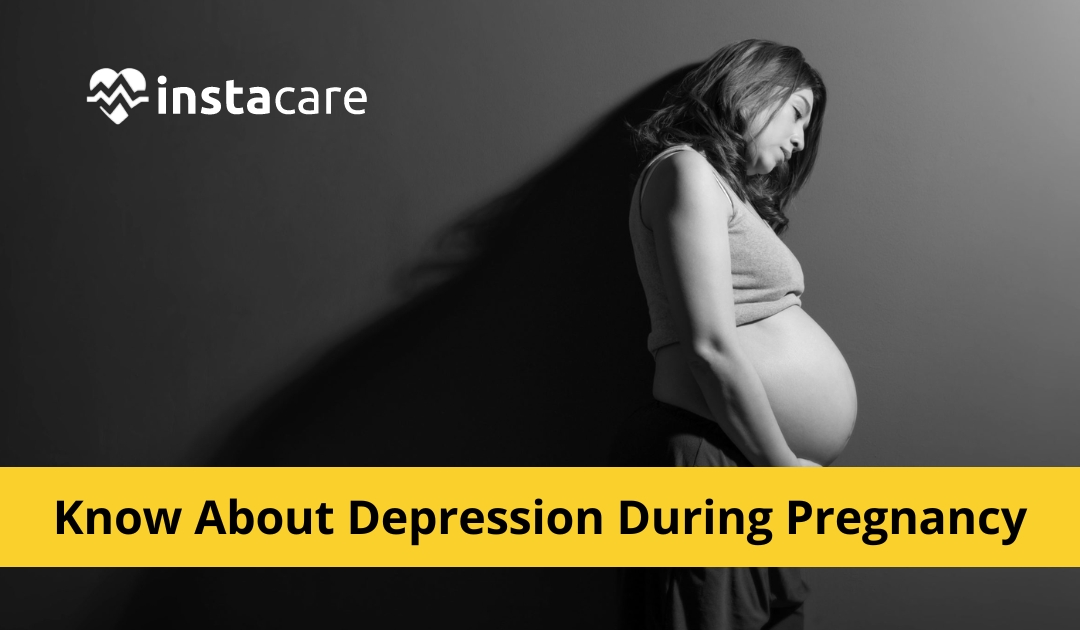Depression is a scary and difficult experience for anyone to face. But many women may be surprised to learn that pregnancy can bring its unique struggles, too – including the risk of developing depression during this special time in their life. Unfortunately, it's an issue that doesn't get nearly enough attention and can lead to devastating consequences if left untreated. In this blog post, we will discuss the risks factors associated with depression during pregnancy, signs & symptoms you should look out for and different treatment options available to help manage your mental health during such a unique period in your life.
What is depression?
Depression is an extremely common mental health disorder that affects millions of people across the world. In general terms, depression can be described as a persistent feeling of sadness, hopelessness, and demotivation that may interfere with everyday routines, relationships, and quality of life. The symptoms of depression can vary greatly from person to person, but typically include things like fatigue, loss of interest in activities that were once enjoyed, feelings of guilt or worthlessness, changes in appetite and sleep patterns, and difficulty concentrating.
While depression can be a serious and debilitating condition, it is also highly treatable. With the help of a mental health professional, individuals with depression can learn coping mechanisms, lifestyle adjustments, and even medication to improve their symptoms and overall well-being.
Depression during pregnancy symptoms
Depression during pregnancy is a condition that affects many women. Symptoms of depression during pregnancy can include feeling sad or anxious, experiencing changes in appetite or sleep patterns, having a lack of energy, and feeling hopeless or guilty. While it is normal to have some mood changes during pregnancy, depression is a more serious condition that should be addressed with a healthcare provider.
Seeking treatment for depression during pregnancy can lead to improved maternal and fetal outcomes and overall health for both mother and child. It is important for women to talk to their healthcare providers about any concerns they may have regarding depression during pregnancy.
How common is depression during pregnancy?
Depression during pregnancy is a serious concern for expectant mothers and their families. According to recent studies, around 10-15% of pregnant women face symptoms of depression during their pregnancy. This condition can cause a range of emotional and physical issues that can negatively impact both the mother and baby. Depression during pregnancy can manifest itself in the form of feelings of sadness, hopelessness, guilt, and anxiety.
Often left undiagnosed and untreated, this condition can lead to complications during pregnancy such as preterm delivery and low birth weight. If you or someone you know is experiencing symptoms of depression during pregnancy, it is essential to seek medical attention to ensure the safety and wellbeing of both mother and baby.
Why does depression during pregnancy often go unrecognized?
Depression can be a challenging experience for any individual to navigate, but it can be especially difficult for women during pregnancy. Unfortunately, many expectant mothers do not receive adequate support for their mental health throughout this exciting time in their lives. According to recent studies, between 14% and 23% of pregnant women experience depression. Despite these statistics, depression during pregnancy often goes unrecognized.
This may be due in part to factors such as the stigma surrounding mental illness, a lack of public awareness, and healthcare providers not adequately screening for depression. Whatever the cause may be, recognizing and addressing depression during pregnancy is crucial for the health of both the mother and child. Understanding the challenges that pregnant women face in coping with depression can help increase awareness and hopefully inspire positive changes in the future.
Is it common to get depressed during pregnancy?
Depression during pregnancy is a topic that is becoming increasingly discussed and recognized within the medical community. While some women experience heightened feelings of happiness and excitement during pregnancy, others may find themselves feeling overwhelmed or down. According to recent studies, approximately 7-20% of pregnant women experience some form of depression.
The causes of depression during pregnancy can vary and may be related to a range of factors, such as hormonal changes, stress, or unresolved emotional issues. It is important for expectant mothers to seek professional help if they believe they are experiencing symptoms of depression as it can impact both the mother and the baby's health. With the right support and treatment, however, many women can find relief from depression and go on to have a healthy and fulfilling pregnancy.
What factors increase my risk of being depressed during pregnancy?
Pregnancy is a complex and challenging experience for many women. For some, it can be accompanied by a heightened risk of depression. Depressive symptoms during pregnancy can be triggered by a variety of factors, including hormonal changes in the body, stress, lack of social support, socioeconomic status, and prior mental health issues.
Understanding the risk factors for depression during pregnancy can help women manage their symptoms and minimize their risk of developing postpartum depression. If you are experiencing depressive symptoms while pregnant, seeking professional help is crucial for your mental health and the health of your growing baby.
Does pregnancy cause depression?
Depression during pregnancy is a complex issue that affects many expecting mothers. While it is not a universal experience, many women struggle with the emotional challenges of pregnancy which can lead to depressive symptoms. Research has shown that up to 20% of women experience depression during pregnancy, far higher than rates of depression in the general population. Factors that contribute to depression during pregnancy can include hormonal changes and physical discomfort, but there are also social and psychological factors that can exacerbate the condition.
Women who feel isolated or unsupported during their pregnancy may be more vulnerable to developing depressive symptoms. It’s important to recognize that depression during pregnancy is a legitimate condition and can have significant impacts on both the mother and her developing baby. Seeking support from healthcare providers, family, and loved ones can make a big difference in managing the symptoms of depression during pregnancy.
What are some of the signs of depression during pregnancy?
Pregnancy is supposed to be a time of joy and excitement, but sometimes women experience depression during this time. Depression during pregnancy is more common than many people think, and it can be hard to recognize since some symptoms overlap with those of pregnancy itself, such as fatigue, changes in appetite, and difficulty sleeping.
However, there are some tell-tale signs of depression during pregnancy that expecting mothers and their loved ones should watch for, including feelings of sadness or hopelessness, loss of interest in activities, difficulty concentrating, and an increase in irritability or anxiety. Prompt diagnosis and support are crucial for both mother and baby's health, and knowing these signs can help women take necessary steps to get the help they need.
How does depression affect pregnancy?
Depression is a common mental health condition that can affect anyone, including women during pregnancy. While pregnancy is supposed to be a time of joy and anticipation, it can also be accompanied by stress, anxiety, and depression. Depression during pregnancy can take a toll on both the mother and the developing baby.
Some of the common symptoms of depression during pregnancy include lack of appetite, trouble sleeping, lack of energy, and feelings of worthlessness or guilt. If left unaddressed, depression can lead to complications such as premature delivery, low birth weight, and developmental delays. Seeking professional help and support from loved ones can make all the difference in managing depression during pregnancy and promoting the well-being of both the mother and the baby.
View More: Treating Vaginal Pain During Pregnancy - 9 Proven Strategies For Moms-To-Be
What are my options if i’m depressed during pregnancy?
Depression during pregnancy is a difficult topic to discuss, yet it is incredibly important. If you're feeling depressed during pregnancy, know that you are not alone. Approximately one in every seven pregnant women experiences depression. It's essential to work with your healthcare provider to explore all available options, including medication, therapy, and lifestyle changes like exercise and relaxation techniques.
Your doctor may also recommend a support group or a referral to a mental health specialist. Remember, your mental health is just as important as your physical health during pregnancy, and with the right treatment plan, you can feel better and enjoy a healthy pregnancy.
Are antidepressant medications safe during pregnancy?
Depression during pregnancy can be a difficult and challenging experience for many expectant mothers. It is a serious mental health condition that requires attention and treatment. Some women may turn to antidepressant medications to alleviate symptoms of depression during pregnancy, but the safety of these medications is a topic of concern.
While there are valid reasons to be cautious about taking antidepressants during pregnancy, it is important to understand the potential risks and benefits of these medications. Talking to a healthcare provider is crucial in making an informed decision about the safety and effectiveness of antidepressant medications during pregnancy. And seeking professional support and care can help women achieve a healthier and happier pregnancy.
Depression during pregnancy effects on baby
Pregnancy is often considered to be a time of pure joy and excitement, but unfortunately, it's not always the case. For many women, pregnancy can be a challenging time, especially when depression strikes. While it's becoming more common for women to talk about the challenges of depression during pregnancy, it's important to understand the impacts this can have on the baby.
Several studies have shown that babies born to mothers with depression during pregnancy are at a higher risk of a range of problems including stunted growth, pre-term birth, and developmental delays. Not only this, but these babies are also at a greater risk of adverse behavioral and emotional outcomes later in life. This just goes to show just how important it is to seek help and support during pregnancy, especially if you're struggling with depression.
Depression during pregnancy and postpartum
Depression during pregnancy can be a challenging experience for women, as it not only affects them but also their unborn child. While it is common to experience mood swings during pregnancy due to hormonal changes, feelings of sadness, hopelessness, and low energy that persist for longer periods can be signs of depression.
It is essential to seek medical help if these symptoms persist as depression during pregnancy can lead to complications like premature birth, low birth weight, and developmental problems in babies. Women who experience postpartum depression, a depression that occurs after giving birth, are also at risk of experiencing depression during pregnancy. Thus, it is vital for women who have a history of depression, anxiety, or bipolar disorder to disclose it to their healthcare provider to get timely support and care.
Depression during pregnancy statistics
Depression during pregnancy is a common condition that affects many women. According to recent statistics, about one in seven women experience symptoms of depression while pregnant. This can be a challenging time for expecting mothers who may already be experiencing physical and emotional changes. Despite the prevalence of depression during pregnancy, it is often unrecognized and untreated.
It is important for healthcare professionals and loved ones to be aware of the signs and symptoms of depression during pregnancy and to provide support and resources for those in need. By acknowledging and addressing depression during pregnancy, we can help ensure the health and wellbeing of both mothers and their babies.
Depression during pregnancy is called?
Depression during pregnancy, also known as antenatal depression, is a mental health condition that affects many expecting mothers. While pregnancy is often thought of as a joyful time, it can also bring on a range of emotions, both positive and negative. Hormonal imbalances, physical changes, and the stress of preparing for a new baby can all contribute to feelings of sadness, anxiety, or hopelessness.
It's estimated that up to 20 percent of pregnant women experience depression, but despite its prevalence, it's often not recognized or treated. Without proper support and care, depression during pregnancy can have significant impacts on both the mother and the developing baby. It's important for expecting mothers and their loved ones to be aware of the signs and symptoms of depression during pregnancy and to seek help if needed.
Is depression a common symptom of pregnancy?
While pregnancy is viewed as a time of excitement and happiness, it's important to recognize that there can be challenges that come with it too. Depression during pregnancy is a common problem experienced by many women. Hormonal changes during pregnancy can contribute to mood swings and depression, but other factors such as stress, physical changes, and other medical conditions can also cause it.
It is crucial for expecting mothers to receive the necessary support to ease the symptoms of depression during pregnancy. It's important to talk about any changes in mood or feelings with a healthcare provider and work together to find a treatment plan to ensure the well-being of both the mother and the baby. By recognizing and addressing depression during pregnancy, women can continue to enjoy this special time in their live.
What kind of depression do you have while pregnant?
Depression during pregnancy is a serious condition that affects many women. It's important to understand that there are different types of depression that can occur during this time, including major depressive disorder and perinatal depression. Major depressive disorder is characterized by persistent feelings of sadness, hopelessness, and a loss of interest in activities that were once enjoyed.
Perinatal depression, on the other hand, is a term used to describe depression that occurs during pregnancy or in the first year after giving birth. It's critical for women who are struggling with depression during pregnancy to seek help from a healthcare provider. While this condition can be challenging, effective treatments are available, including therapy and medication, that can help manage symptoms and support a healthy pregnancy.
Does sadness affect pregnancy?
Depression during pregnancy is a prevalent issue that affects millions of women worldwide, causing a wide range of emotional and physical symptoms. While some expecting mothers are fortunate enough to experience a happy and stress-free pregnancy, others may find themselves struggling to cope with the overwhelming feelings of sadness, hopelessness, and despair.
Studies show that untreated depression during pregnancy can have serious consequences on both the mother and the baby's health, including preterm labor, low birth weight, and developmental delays. Therefore, it is essential for women to seek professional help and support from their healthcare providers to address any symptoms of depression during pregnancy and ensure the best outcomes for both themselves and their newborns.
What are the recommendations for screening for depression during pregnancy?
Depression during pregnancy, also known as antepartum depression, is a common occurrence in expectant mothers. According to studies, approximately 10-15% of women experience depression during pregnancy, making it a crucial issue that requires attention. Unfortunately, depression during pregnancy often goes unnoticed and untreated, which can lead to severe health consequences for both the mother and the baby.
To reduce the risk of these negative outcomes, various organizations recommend screening for depression during routine prenatal visits. Doctors can use simple questionnaires, such as the edinburgh postnatal depression scale (epds), to identify women who may be at risk of depression. With early detection and appropriate treatment, both mothers and babies can lead happy and healthy lives.
Is pregnancy a risk for depression?
Depression during pregnancy is a topic that has gained increased attention in recent years. While pregnancy is often portrayed as a magical time in a woman's life, it can also be a time of increased stress and anxiety. Studies suggest that up to 20% of pregnant women experience depression.
These women may experience feelings of sadness, hopelessness, and fatigue, and may struggle to manage their daily responsibilities. Depression during pregnancy can also increase the risk of complications such as preterm birth and low birth weight. It's important that pregnant women receive the support and care they need to manage their mental health, both for their own well-being and the health of their unborn child.
Depression during pregnancy treatment
Depression during pregnancy is a complex issue that women face, and it can be challenging to manage. Hormonal changes, increased stress, and worries about the future can all contribute to depression symptoms during this critical time. Treatment options vary depending on the severity of the depression, but seeking help and support is essential.
Medications, therapy, and support groups are a few of the treatment options available to women struggling with depression during pregnancy. It's crucial to address and treat depression during pregnancy because, left untreated, it can negatively affect the health of both the mother and the baby. Women should always seek medical advice from a trusted healthcare provider when dealing with depression during pregnancy.
Please book an appointment with the best Gynecologist in Lahore, Karachi, Islamabad, and all major cities of Pakistan through InstaCare, or call our helpline at 03171777509 to find the verified doctor for your disease.











